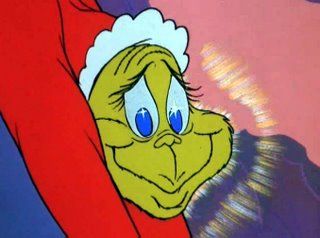Article
Neuroscience Explains Why the Grinch Stole Christmas
Author(s):
A study on the effects of loneliness explains why the Grinch terrorized Whoville.
The following was originally posted to the Psychology Today blog Neuronarrative.
"You're a mean one, Mr. Grinch."
But why?
We all know Dr. Seuss's iconic tale of the green ogre who lives on a mountain, seething while the Whos in the village below celebrate Christmas. The happier they are, the angrier he gets, until finally he can't take it anymore and hatches a plan to steal away their joy.
Dr. Seuss was a brilliant intuitive psychologist, and I'd have loved to chat with him about the core of the Grinch's rage, but, alas, he left us too early. So I'm turning to another impressive thinker who has taught me a great deal about the neurobiology of emotion: Dr. John Cacioppo, a pioneer in the field of social neuroscience and co-author of the book, Loneliness: Human Nature and the Need for Social Connection.
Cacioppo has conducted a wealth of research about the effects of loneliness on the human brain. We're not talking about physical loneliness (although that can be part of the equation); we're talking about a sense of loneliness that someone in the midst of thousands of people can feel.
I saw an interview with John Bon Jovi who was describing the feeling he gets after he leaves the stage. Surrounded by tens of thousands of fans, you might think that he'd have no reason to feel lonely--but when he goes back to his hotel room, those thousands of people screaming his name may as well not exist at all. He feels alone despite being the center of a publicity universe.
That's much closer to the sort of loneliness Cacioppo studies, and it's especially relevant in the age of social media, where someone might have 2,000 Facebook friends and yet feel like they're completely alone in the world.
If Cacioppo could persuade the Grinch to step into his MRI, he'd likely observe a result consistent with those of a 2009 brain imaging study he conducted to identify differences in the neural mechanisms of lonely and nonlonely people. Specifically, he wanted to know what's going on in the brains of individuals with an acute sense of "social isolation"--a key ingredient in loneliness that has nothing to do with being physically alone, and everything to do with feeling alone.
While in an MRI machine, subjects viewed a series of images, some with positive connotations, such as happy people doing fun things, and others with negative associations, such as scenes of human conflict. As the two groups watched pleasant imagery, the area of the brain that recognizes rewards showed a significantly greater response in nonlonely people than in lonely people. Similarly, the visual cortex of lonely subjects responded much more strongly to unpleasant images of people than to unpleasant images of objects--suggesting that the attention of lonely people is especially drawn to human conflict. Nonlonely subjects showed no such difference.
In short, people with an acute sense of social isolation appear to have a reduced response to things that make most people happy, and a heightened response to human conflict. This explains a lot about people who not only seem to wallow in unhappiness, but also seem obsessed with the emotional "drama" of others. Every office, for example, has a few people just like that.

The Grinch is easier to understand given these findings. He is physically isolated (well, except for his dog), but more importantly he's socially isolated. He feels no sense of connection to the citizens of Whoville, though they live just outside his mountain lair. Watching them surround themselves with happy things like ornaments and gifts and food ticks him off, so he determines to inject some strife into the festivities and watch the fallout. That's what makes him happy.
Fortunately, the Grinch has an epiphany (a Gestalt moment) that makes him not only want to return everything to Whoville, but participate in the merriment as well. The real-life corollary would probably include a couple years of therapy, but Dr. Seuss makes the point well enough: there is redemption for those suffering from loneliness. It requires genuine connection with others--not faces in a cheering crowd or numbers on a Facebook page. Those things might supplement real relationships, but they can't replace them.
And that, it seems to me, is the heart of the holidays: they are ritualized reminders that none of us are islands, and that no matter how many people surround us, we're only at our best when we allow some of them to be part of us.
Happy holidays.
__________________________________________________________________
David DiSalvo is a science, technology and culture writer for Scientific American Mind, Mental Floss, and other publications, and the writer behind the blog, Neuronarrative, which reaches 100,000 readers in more than 200 countries every month. He has appeared on CNN’s Headline News, and his work is referenced in news outlets worldwide. David is also an award-winning public outreach and education specialist with nearly 18 years of experience communicating complex technical messages with palatable prose. He has served as a consulting research analyst and communications specialist for the US Environmental Protection Agency and several other public and private organizations in the US and abroad, spanning from Boston to Beijing.He is feverishly working on his first non-fiction book, tentatively titled, What Makes Your Brain Happy, and Why You Should Do the Opposite (Prometheus Books, 2011). He lives in Florida with his wife and three children.




